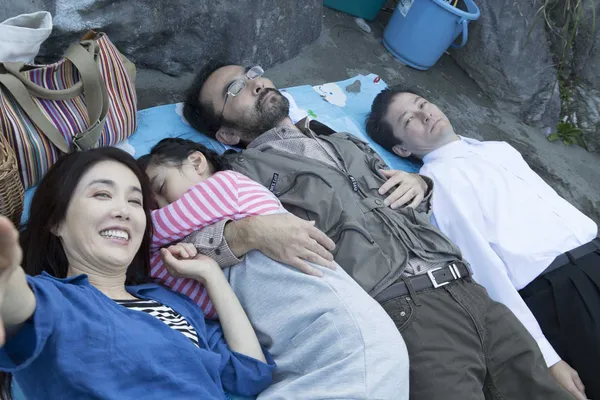Eye For Film >> Movies >> Harmonium (2016) Film Review
Harmonium
Reviewed by: Jennie Kermode

In recent years Japan has been producing a lot of films about unharmonious families, challenging traditional ideas about the family as the cornerstone of social order. In light of this, the family we meet in Harmonium seems astonishingly healthy and functional. Husband Toshio (Kanji Furutachi) runs his own business. Wife Akié (Mariko Tsutsui) is a devout Christian who tries to see and bring out the best in everyone. Ten-year-old daughter Hotaru (Momone Shinokawa) is a bright, lively girl whose only apparent frustration comes from her struggles to master the harmonium, but who is looking forward, nonetheless, to a forthcoming public performance. Of course, there's a hitch. Toshio has a secret. That's why he lets the stranger, Yasaka (Tadanobu Asano) into their lives, and everything starts to break down.
Yasaka is polite and well spoken. He makes a couple of faux pas early on, a first hint at the fact that he has been living at a distance from society for some time, but he quickly apologises and his easy charm beguiles his initially reluctant hostess whilst winning the friendship of her daughter. Gradually he becomes more open about his past, and Toshio starts to get nervous. Sitting at the dinner table together, going on a family outing, everything still seems harmonious, but there's a counter-melody building. The men have known a violence utterly at odds with Akié's philosophy. What happens next will force her to reconsider everything, including her own ability to love.

Exploring themes of grief, penance and revenge, Harmonium also has powerful things to say about gender and the extent to which that idealised harmonious life is founded on the willingness of women to shoulder emotional burdens without complaint. A pivotal scene in the second half sees Toshio adopt a classic revenge film motif by identifying Akié and Hotaru as extensions of himself, but Akié is having none of it, fiercely asserting her daughter's personhood (her own being plain to see). This isn't so much about a crack appearing in their marriage as about Akié suddenly realising that there has always been a gulf between the ways each of them has perceived it. She is determined to be a character in her own story, not a footnote in somebody else's. In the circumstances, that might be a dangerous move.
With strong performances from Tsutsui and Asano, impressive work from young Shinokawa (in only her second big screen role) and a sweetly judged turn from Taiga as a young man who gets caught up in the unfolding drama through an accident of fate, this is a beautifully crafted film. It could probably benefit from being pruned back a bit in the first half, but overall it's well balanced. With circumstances very different in the second half, which takes place eight years later, the dialogue shifts gear, its light touch and much of its subtlety lost. This makes sense in context; the stakes are different now, and nothing that we thought we knew about the characters can be taken for granted.
At the outset, Hotaru tells her parents about a species of spider she has found in the garden, explaining how the female lets her children eat her. Despite assuring her daughter that the noble mother will go to Heaven, Akié admits she doesn't find that idea appealing. But does the spider really make a decision? How much of what we do is governed by instinct? If Akié rejects such a life, can she still be herself? Will she find herself in the same position as Yasaka?
Reviewed on: 10 Feb 2017

















